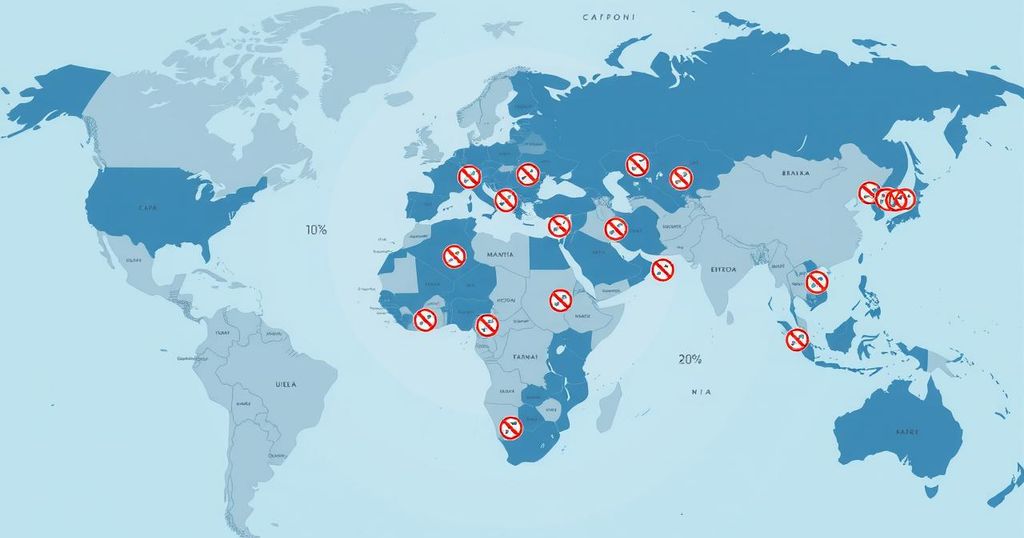Trump Issues New Travel Ban Affecting Nearly 20 Countries: What Travelers Need to Know

President Trump has signed a travel ban affecting nearly 20 countries, citing national security concerns. The ban prohibits entry for nationals from 12 countries and imposes partial restrictions on several others. It takes effect on June 9, 2025, and could complicate travel plans for many. Travelers are advised to seek guidance from authorities regarding their eligibility to enter the U.S.
In a significant move, President Donald Trump has signed a new travel proclamation that will impose bans or partial restrictions on entry for nearly 20 countries, citing national security as the primary reason. This decision, announced on Wednesday, affects foreign nationals primarily from countries deemed to have high visa overstay rates and insufficient screening processes in place. It includes Afghan nationals and nationals from nations like Chad, Eritrea, and Iran, among others.
The travel ban stretches over 12 countries fully barred from entry into the U.S. They are Afghanistan, Burma, Chad, the Republic of Congo, Equatorial Guinea, Eritrea, Haiti, Iran, Libya, Somalia, Sudan, and Yemen. Additionally, there are partial restrictions for nationals from Burundi, Cuba, Laos, Sierra Leone, Togo, Turkmenistan, and Venezuela. Similar to the controversial “Muslim ban” from 2017, this latest proclamation has raised alarms, given its broad scope and implications.
The White House officials have specifically pointed out that this ban targets nations with high rates of visa overstays and weak vetting practices. Former President Joe Biden had previously revoked the earlier ban in 2021, labeling it as a moral failing for the nation. The current proclamation casts a wider net as it fulfills part of Trump’s campaign pledges leading up to the 2024 elections.
Some exemptions are in place for lawful permanent residents and current visa holders, as well as individuals whose entry is deemed beneficial for U.S. national interests. However, the criteria for these exceptions remain unspecified, creating uncertainty among international travelers.
Travelers from the impacted regions should consider changes to their plans. Those applying for work, student, or tourist visas may encounter delays or outright denials when seeking entry to the United States. For existing visa holders in the U.S., renewal may be feasible; however, reentry seems more complicated now.
An important detail to note is when the ban officially begins. According to NBC News, the travel restrictions will go into effect at 12:01 a.m. Eastern Time on June 9, 2025. For travelers arriving from these regions, there could be severe consequences. Airlines may deny boarding to those from the fully banned countries, while others from partially restricted nations may be scrutinized at entry points with delays or potential denials.
Furthermore, for those who have booked tickets prior to the ban, the situation is precarious. Travel enthusiasts from the banned nations should reach out to their airlines or the nearest U.S. embassy for guidance. It is likely that entry for most of these travelers will be denied, but those from partially restricted regions could still potentially travel, albeit with a heavier burden of inquiry and screening.
As always, travelers are encouraged to consult the U.S. State Department’s website or seek advice from immigration attorneys to assess their situation accurately under this new travel proclamation. The situation remains fluid and could evolve further as more details emerge.
The announcement of a new travel ban affecting nearly 20 countries underscores ongoing concerns surrounding national security and immigration policy in the United States. The implications for international travelers, particularly those from designated countries, are significant, with broad restrictions now in place. As details regarding exceptions and enforcement continue to develop, affected individuals are strongly urged to seek updated information and legal counsel to navigate these complex changes.
Original Source: www.usatoday.com






